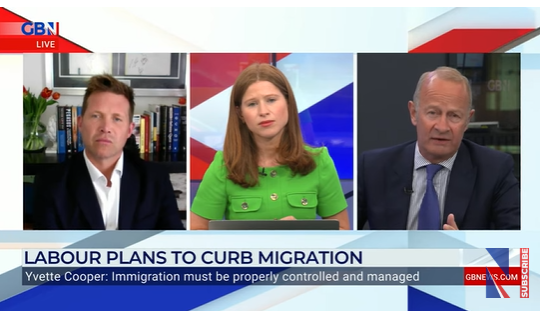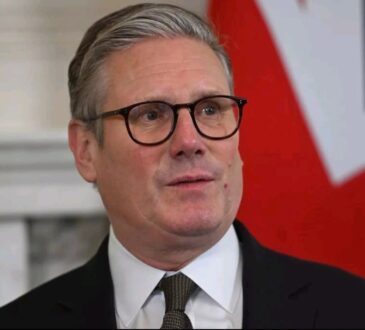Henry Bolton Asserts That the UK Faces a ‘Systemic Problem’ Regarding Immigration, Urging the Need for Immediate Attention

Shadow Home Secretary Yvette Cooper has raised eyebrows today as she’s claimed that Labour would curb immigration by putting time limits on how long companies are able to import foreign workers in shortage occupations. Downing Street has also refused to apologize, despite failing to reduce net migration, which has now risen to record levels. ONS data shows numbers rose to 606,000 last year, even after repeated government pledges to bring overall numbers down.
After the figures were released, here’s what Immigration Minister Robert Generic said about tackling the issue: “Net migration is far too high. This is placing intolerable pressure on public services, on housing supply, and our ability to integrate people into our country. The Conservative Party has made a promise to reduce net migration, and we’re absolutely determined to do that. Well, we’ve made a very significant intervention this week which will make a tangible difference, reducing the number of student dependents that come to our universities because universities should be in the education business, not the immigration business.”
In an interview with international human rights lawyer David Haye and International Security and Border Control expert Henry Bolton.
So, I think it’s quite interesting, and of course, there’s a lot of politics going on in this whole discussion. But Labour is presenting themselves as being tough on immigration. We all know that immigration levels and mass immigration started under the Blair government, don’t we?
Interviewer: Henry, do you think the general British public will trust a word coming from the Shadow Home Secretary and the Shadow Prime Minister?
Only those people who want to, and I mean by that, their own supporters already, because it’s an easy stick to beat the Conservative government with. Of course, everybody’s criticizing the Conservative government. They keep coming up with promises that they’re going to do X, Y, and Z with the borders and with immigration, but they keep failing to do so. It’s a very easy political win for the Labour Party to just throw this out there. What I’d like to see is every time that one of these Labour front benches or even backbenches says such a thing, okay, where is the detail? Why are you going to be able to deliver this when the Conservative Party aren’t delivering it? And I think there’s a lot of work to be done on getting them to come up with a how. Yes, it’s easy to say you’re going to do something, as we saw with David Cameron promising to get immigration down to the tens of thousands and then actually doing it.

Interviewer: David, Labour says they’d curb immigration by putting time limits on how long companies are able to import foreign workers in shortage occupations. What does that mean?
The difficult thing here is that that isn’t the issue, I think, in terms of, you know, they are not the problems when people come here for companies and one would say legally so. I think what you might see is that you’ve got the Labour Party realizing that the Tory Party is essentially effectively trying to weaponize immigration and trying to use that to win votes, and obviously, they’re doing a very bad job of that in terms of none of the policies they’re actually getting off the ground at the moment. So, I think the Labour Party is looking at trying to steal their thunder, as it were. But I think attacking or looking at corporate immigration, which is not the area where there’s that many overstayers, is perhaps a failed attempt.
It’s quite interesting, Henry, because a lot of the discussion about immigration has focused on the impact on the economy. It seems to be that there is a consensus among most of the political elite, media elite, or whatever you want to say, liberal metropolitan elite, whatever word, that immigration has been an economic success story. Is it more complicated than that? It’s a great deal more complicated, Emily. Let’s look, for example, at the money that goes out of the country for individuals sending money home. World Bank figures for the latest ones for 2021 were 8.7 billion going out.
Now, of course, then other people will say, “Yes, but students bring in 44 billion.” But what I’m saying is that it’s not simple, 8.7 billion versus 44 billion. Also, they talk about doctors coming into the NHS. That’s fine, and indeed, immigrant doctors do contribute to the NHS. But it’s not quite that simple because, of course, when you’ve got an increase in the population of 606,000 net, you’ve got to provide more doctors anyway. Doctors you do, I mean, the net is a plus in terms of the additional doctors available, but it’s not a straightforward calculation. Plus, remember, we’re paying the money out not only to provide asylum seekers with funding, but also all of the infrastructure and so on, all of the facilities that are in place to simply process all of these people coming in. Most of that does sit in the asylum area, but there are not simply black and white.
No, David, it does seem like we’re on a treadmill that we constantly have to be keeping up with, demanding our public infrastructure by then bringing more people in from abroad, and so on and so forth. We’re not concentrating on how to make our own country sustainable for the long term. If you were looking at these statistics that we’ve seen from the past year, where would you say we could start cutting the numbers? Because, of course, people look at things and they say, “Oh, worker visas, well, we need them for these shortages. Students are good for the economy. We want them to prop up our universities. Hong Kong as well, you know, we need to protect them, and they’re good for the economy. Ukrainians, well, of course, we can’t say no to the Ukrainians.”
So where do you actually, in practice, start cutting the numbers?
I think what would make sense, and something that the government, I don’t think any government has effectively done, is target the largest number of people breaking the immigration rules, and those are overstayers. Those are the people that come on student visas and overstay, not their families that come while they’re legal, but people that come and overstay, whether it’s tourists or whether it’s student visas or work visas. That’s the biggest number.
Presumably, if we had effective border controls on entry and exit, it’s fairly easy to see who’s coming in, who’s going out, and who’s here illegally, and then find them and deport them in an appropriate manner in accordance with human rights law. But that’s something that, you know, I trained in immigration law a long, long time ago. It was a problem then. It’s still a problem now, and it’s not being addressed. Now, of course, that’s not a policy, and, like I said, weaponizing immigration and xenophobia, that doesn’t help the Tory party as much as people coming across boats does and stop the boats campaigns and rattling sabers. But that’s, you go to the biggest number, address that first, and then move down, and that’s something that isn’t still being effectively done.
Note: This was interview conversations on gbnews tv




